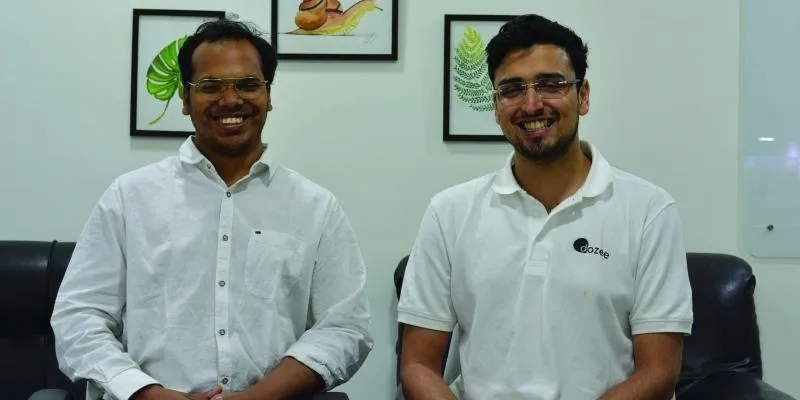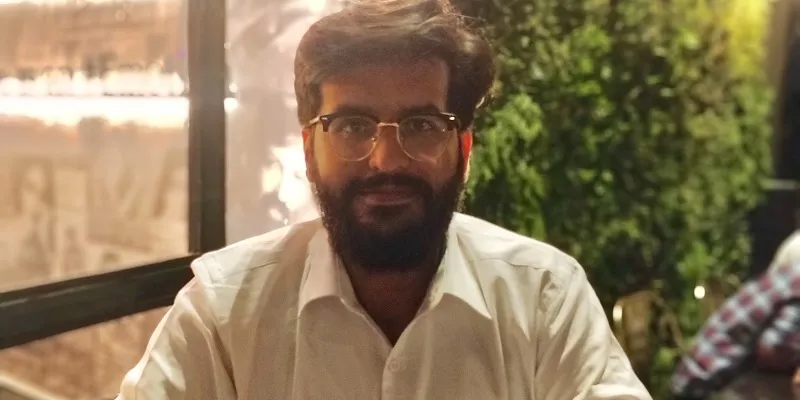WATCH: How Dozee hopes to win the $5B medical device market with its contactless heart monitor
Medtech startup Dozee has created a contactless device that tracks sleep patterns, heart, respiration and stress levels. In this video interview with YourStory Business Editor Vishal Krishna, the founding team talks about how the patent-pending monitor can help India stay on top of its health.
IIT graduates Mudit Dandwate and Gaurav Parchani love physics, biology, mechanics, and capturing data from the physical world. In fact, Mudit designed and raced cars, especially electric cars with F1 speeds, at Silverstone, and was also the Chief Vehicle Dynamics Officer at IIT-Mumbai.
The two befriended each other while working at Altair Engineering. Their love for engineering, hardware, and software led them to explore the healthcare sector in 2013. Realising that ECG monitors and blood pressure monitors work only in contact with the body, they wanted to do one better.
Their hypothesis was to challenge conventional wisdom, especially consumer healthtech, and provide accurate data. They found that most devices do not have the capability to record stress, heart activity, and sleep cycles with 99 percent accuracy. At best, they offered 75 percent accuracy. Mudit and Gaurav quit their jobs in October 2015, and plunged themselves into R&D. In this video interview, the core team of Bengaluru-based Dozee reveals how they got started, the challenges they faced, and the way ahead.
Tackling the problem statement
The first step to prove their hypothesis was to go contactless and take on existing monitors built by large medtech companies. The second was to prove that a contactless device could be more accurate.
Mudit recalls, “I was in Frankfurt for my 24th birthday and I wanted to do something more meaningful in life. I have a deep knowledge in vibration engineering and wanted to capture vibrations for human health.”
The duo knew healthcare was complex, but was keen to change the paradigm in contactless health monitoring. They started gathering data of stress levels, heart rates, respiration, and sleep. Within a year, their first device - it sat under the bed of patients - was being used at NIMHANS and Jayadeva in Bengaluru to record accurate information.
“We knew by going contactless we needn't have any regulatory approvals, and the doctors were kind enough to work with us on the problem statement,” Gaurav says.

Mudit Dandwate and Pritish Gupta.
Also read: How incubator-turned-medtech company InnAccel is innovating for India’s needs
What was the problem statement? The device had to rid the patient of being connected with electrodes that capture data; electrodes that are commonly seen on all patients admitted to hospitals.
“We had a regressive testing cycle. The product changed a lot over two years. I had specialists help me build and design the device. The heat generated by the device is lower than 0.5 watt. By 2018, our contactless health monitor had tested a lot of people,” Mudit says.
He adds that the product was to enable hospitals and be simple enough to be used at home, saying, “healing happens at home.” The monitor has been tested on burn patients, psychiatric patients, and accident victims, and can be used at home to check vitals.
The device resembles a thin mat with a cotton/jute finish, and is designed to be light and portable. Manufactured in Bengaluru, it captures vibrations of the heart and has recorded 2,000 hours of data.

Gaurav Parchani.
The duo tested this on 1,000 people in five hospitals by 2018. This is when Mudit brought in his friend, Pritish Gupta, a former BCG consultant, as the CMO and co-founder. Pritish says, “Mudit chased me for over a year to join him. I finally conceded because I saw the potential of the product. I also used it to help my dad who was suffering from sleep apnea.”
Dozee is now taking pre-orders, and has raised Rs 4 crore from angel investors.
Also Read: This startup founded by IIT alumni could be a cure for the pharma industry's compliance issues
The strategy to market
The company competes with contactless monitoring companies in the US like MFit, Early Sense, and Bed It. Dozee’s distribution strategy is to sell to each state and territory, and it plans to work on a consignment model with a few distributors.
Pritish says, “Credibility of our startup is important. Focusing on social media is key for people to discover the product. Finally, people adopting it will make the difference. Dozee has a B2B business to work with hospitals and a B2C business too.”
In the next three years, the company plans to reach 50,000 people and 100 hospitals.
“The positioning is key. We have figured a lot of use cases for post-operation and pre-operation, and have several product lines in the future,” Pritish adds.
With Dozee, a doctor knows the baseline of each patient. “A marathon runner has a different baseline of health deterioration than a person who drinks and smokes. The data is key, and personalised,” Gaurav says.
A potential success
With rising healthcare costs, increasing lifestyle diseases, and a growing elderly population, Mudit believes the lack of medical infrastructure to track these is the opportunity Dozee needs to tap into.
The WHO states that 25 million Indians suffer from cardiovascular diseases, almost 60 percent of the global number. Overcrowding and bad living conditions increase stress levels, leading to coronary heart diseases and several other ailments. According to the department of pharmaceuticals, the market for medical devices in India is worth $5 billion.
Dozee is just entering commercial scale and does not want to disclose revenue numbers yet. Its 16-member team is hard at work, and is proud to have two dogs as company mascots.
The trio may not have a medical background, but has read several international papers on medicine and medical hardware and done its research.
Mudit says, “We all agree to disagree as a team, and that's what makes us tick because we are joined together for a mission to change the way India lives."
Also read: How a health scare led this IIT alumnus to launch an Ayurveda-based preventive care startup







